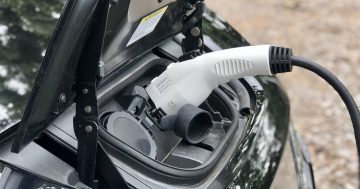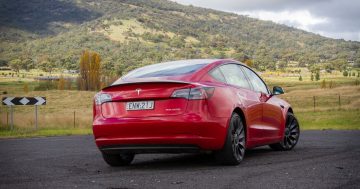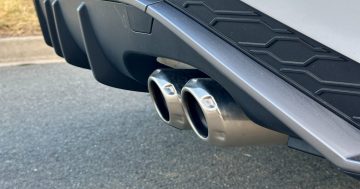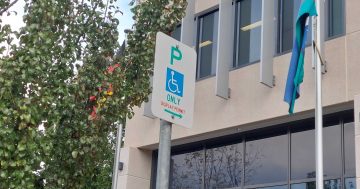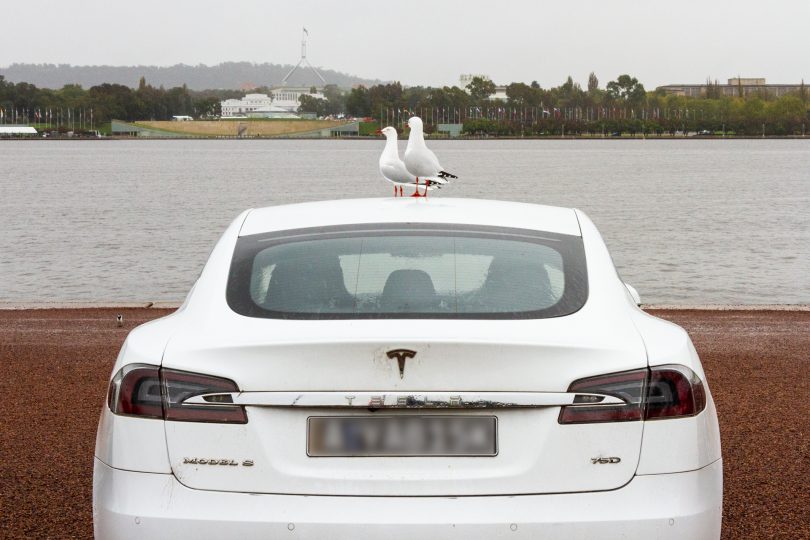
An electric future is on the way for Canberrans, but there are concerns the government’s strategy risks leaving the most vulnerable behind. Photo: James Coleman.
The ACT’s move to an all-electric future is leaving the most vulnerable behind and the government is getting the balance wrong.
That’s the message from the Territory’s Council of Social Service (ACTCOSS) which has been left “disappointed” by some aspects of the ACT’s recent Zero Emissions Vehicle (ZEV) strategy.
Chief Minister Andrew Barr and Minister for Energy and Emissions Reduction Shane Rattenbury released the ZEV policy document in late July.
It set out a number of policy settings, including the scrapping of duty on second-hand zero-emissions vehicles (ZEVs) from August this year and a future overhaul of the vehicle registration system from one based on weight to emissions.
It also included a commitment to banning new fossil fuel vehicles from being registered in the ACT from 2035. The exact details of how this would work have yet to be worked out. But the government was quick to say this ban would not force cars off the road.
Mr Barr in July deflected questions about whether these future changes would be fair to Canberrans who couldn’t yet afford to make the transition to a ZEV, saying equity could be ensured and this would be worked out.

ACTCOSS CEO Dr Emma Campbell is urging the government to do more to ensure vulnerable and low-income Canberrans are not left behind. Photo: Thomas Lucraft.
But ACTCOSS CEO Dr Emma Campbell said the current policy of subsidising the purchase of electric vehicles through stamp duty cuts was an “inefficient use of government spending” because those households could afford to buy one without any incentives.
She said those on low incomes faced the opposite problem because they could not afford to buy one even with the incentives on offer.
Dr Campbell said evidence from the United States showed rebate programs for purchasing ZEVs had disproportionately favoured those on high incomes. Research also found more than half of people purchasing a ZEV said the schemes made no difference to their plans or ability to obtain the vehicles.
“It is likely only a matter of time before the cost of ZEVs is on par with non-ZEVs, and for people on low incomes the more pressing barriers to uptake include running costs and infrastructure availability,” she said.
“Many people on low incomes rent their homes and/or live in multi-unit complexes and are unable to install chargers. The ACT Government should prioritise resources for building accessible and widespread infrastructure, rather than subsidising high-income households to buy what is likely their second car.”
Dr Campbell is calling for the government to focus its spending on low-income households, including ensuring all new multi-unit developments are fitted with the capacity to charge electric vehicles, and investments to support community sector organisations to transition to ZEV.
She was disappointed the government had not yet foreshadowed offering specific support to community organisations to make the switch from an ICE (Internal Combustion Engine) car to an electric car.
“We need policy addressing the impacts of climate change, but that policy must not perpetuate inequality. The current investment in subsidising electric vehicles for some of the wealthiest people in Canberra has not achieved the right balance of priorities,” Dr Campbell said.
ACTCOSS is overall supportive of the ACT’s Zero Emissions Vehicle strategy and is urging the government to consult with the community to get the policy settings right so no-one is left behind.
The ACT Government is also rolling out charging stations across the city and will offer incentives of up to $2000 for established apartment buildings to retrofit ZEV charging infrastructure.
By 2030, it’s forecast the ACT will need more than 500 publicly accessible electric vehicle chargers.












